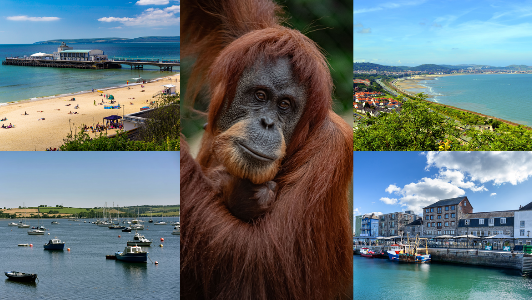Chester Zoo ‘s ‘Sustainable Palm Oil Communities’ Nationwide rollout gathers pace #Chester Food and Drink Month
Victoria Hayes
24th September 2021

We are so proud to be home to Chester Zoo.
A registered conservation and education charity. Home to more than 20,000 animals and more than 500 different species, many of which are endangered in the wild, the zoo also supports field projects around the world and closer to home, preventing the extinction of highly threatened species. It is the UK’s most visited zoo and England’s most visited tourist attraction outside London.
Chester became world’s first ‘Sustainable Palm Oil Community’ in 2019, with Oxford and Newquay then pledging to follow suit. This Rainforest-saving initiative was developed by conservationists at Chester Zoo. Now, Dorset, Plymouth, Saltash and Mochdre have all committed to the scheme as its nationwide rollout gathers pace
Restaurants, schools, businesses and attractions will all switch to sustainable palm oil, increasing pressure on major suppliers to change their supply chains.
Sustainable palm oil is key to preventing orangutan extinction, say conservationists and call on more areas to get on board.

Dorset, Mochdre, Saltash and Plymouth (pictured clockwise from top left) have committed to become Sustainable Palm Oil Communities – following a model developed for the city of Chester by wildlife conservationists at Chester Zoo
Four new areas across the UK have pledged to become ‘Sustainable Palm Oil Communities.’
The county of Dorset, the city of Plymouth, the town of Saltash in Cornwall and the village of Mochdre in North Wales have all committed to the ambitious scheme – spearheaded by conservationists at Chester Zoo – as its nationwide rollout gathers pace. The major initiative is designed to protect vital habitat for wildlife and prevent the extinction of species, such as critically endangered orangutans.
Unsustainable production of palm oil is wiping out huge areas of rainforest – in order to provide the ingredient for food and household products consumed in the UK and around the world.
The movement requires restaurants, schools, workplaces and attractions within each community to use and support sustainable palm oil, which leading conservationists, conservation organisations, wildlife charities and NGOs, backed by detailed scientific research, say is the best way to prevent habitat destruction and protect biodiversity.
Efeca, a consultancy providing businesses with support on the sustainable and legal sourcing of natural resources, is leading the move to make the entire county of Dorset a Sustainable Palm Oil Community.
Emily Fripp, Director at Efeca, said: “Having worked with multinationals and governments on sustainable palm oil for many years, everyone at Efeca wanted to give something back to our local community. We worked alongside Chester Zoo and Chester as they achieved their Sustainable Palm Oil City status, so we now want to help Dorset become the world’s first Sustainable Palm Oil County. We already have some champions on board and know that our community here on the sunny south coast will continue to grow over the next year.”
Almost 100 globally-renowned conservation organisations, including Chester Zoo, WWF, the Jane Goodall Institute, Conservation International and Save the Rhino, plus NGO’s working in South East Asia, the epicentre for the issue, have long advocated that embracing sustainable palm oil and halting deforestation is the best solution to the palm oil crisis.
Cat Barton, Field Programmes Manager at Chester Zoo and a specialist on deforestation-free commodities, said:
“Despite significant progress, products containing unsustainable palm oil still come into the UK every single day. However, as more and more places get on board with our new Sustainable Palm Oil Communities movement to demand sustainability, the pressure is being cranked up on the major suppliers to change and move towards deforestation-free palm oil.
“Our movement is already helping businesses in Chester, Oxford and Newquay to influence their suppliers to switch to sustainable ingredients. These changes are then passed along the chain to other customers – it’s a snowball effect.
“Now, we’re seeing that effect spread around the UK. We’re on the cusp of making sustainable palm oil the norm. Together we can create a turning point in the fight to prevent extinction and have a hugely positive impact on wildlife, by influencing the main supply chains to switch to deforestation-free, sustainable ingredients. 
“The UK Government has outlined an urgent need to shift to deforestation-free commodities as part of its new Environment Bill. Chester Zoo is fully committed to continuing to do all we can to push that forward and ensure it happens. Right now, we’re on the brink of losing species forever and so the natural world depends on it.”
Conservation experts say if consumers and organisations were to stop using palm oil entirely, an alternative supply would need to be found for the global demand for edible vegetable oils. With other oil crops – such as coconuts, soya, olives, sunflowers and maize – being less productive per square kilometre, this would result in even more land being cleared and converted to agriculture. Experts also argue that the only way to create change within the industry to achieve better outcomes for wildlife, is to engage with the industry itself.
Sustainable palm oil production dictates there must be no planting on peat land, no fires to clear the land, human rights must be respected, and, vitally, under the Roundtable on Sustainable Palm Oil’s (RSPO’s) new 2018 criteria, it must be deforestation free.
Faye Sherlock, Chester Zoo’s Sustainable Communities Project Officer, added:
“The palm oil issue is complex and not at all black and white. Due to its high yield from small land areas when compared to other vegetable oil crops, boycotting palm oil is counterproductive; shifting the issue elsewhere, creating even greater habitat loss and negative impact on biodiversity. We strongly believe therefore that part of the solution is embracing deforestation-free sustainable palm oil – raising awareness with individuals, communities and businesses and creating increased demand for sustainable.
“The industry isn’t going to go anywhere as other countries will continue to buy unsustainable palm oil, even if we in the UK stop buying it. That’s why we need to create a whole industry change. If we don’t engage the industry, we won’t change the industry. Indeed, that should go for all commodities. Just avoiding one commodity isn’t a proper solution if we seriously want to improve the outlook for wildlife, globally. The answer has to be to work together to make all agriculture deforestation free. 
“Sometimes environmental issues can make people feel powerless. But, with palm oil, we can all make a difference. Consumers have the power to drive change by choosing products and supporting businesses that use sustainable palm oil – as it in turn heightens demand on suppliers and growers. Together we can all play our part in helping to stop deforestation. By embracing a more sustainable future, we can bring a halt to this crisis before it’s too late, and stop the loss of habitat for orangutans and other threatened species.”
For more info and to see a list of the many leading conservation organisations committed to driving the palm oil industry in the right direction, supporting deforestation-free sustainable palm oil, please see: www.chesterzoo.org/news/sustainable-palm-oil-statement/
Download a detailed shopping list to see what brands offer certified sustainable palm oil products here: https://www.chesterzoo.org/schools/resources/sustainable-palm-oil-shopping-list/
For more info and guidance on becoming a Sustainable Palm Oil Community, contact [email protected]
The Oakfield
Cedar House – Chester Zoo, Caughall Road, Chester, CH2 1LH

The Oakfield is no ordinary pub. Situated in the heart of Chester Zoo, this is a truly unique contemporary British pub. Indulge in freshly prepared locally sourced food.
More information